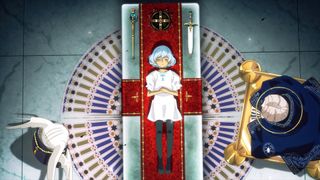Metaphor: ReFantazio is shaping up to be far larger than Persona, and I've already fallen in love with its high fantasy twist on traditional RPGs
Preview | Archetypes are developer Atlus' answer to the genre's usual job systems

If you were to call Atlus' upcoming game Metaphor: ReFantazio "Persona with elves," you wouldn't be too far off the mark. Being compared to such well-regarded and beloved games is far from a bad thing, since its modern entries – namely Persona 3, 4, and 5 (and their various versions) – are widely considered to be some of the best RPGs around. However, Metaphor: ReFantazio is far from being a high schooler in wizard's clothing, and it has several qualities that will help it stand on its own.
Few things in this world will get me on an RPG's bandwagon faster than the words "job system," which, in Metaphor's case, comes via archetypes. Recently, I got some extended hands-on time with Metaphor, and this particular twist on the genre may just end up being my favorite part of the game.
Party on

When I begin my preview, it's clear that Metaphor's setting is awash in prejudice and anxiety. When the king of the United Kingdom of Euchronia is assassinated, its people are thrown into an election to determine their next ruler. As the protagonist – a member of the Elda tribe, viewed as tainted by most people – you join your fairy partner Gallica on a mission to lift a curse from the land's prince, who is believed to be dead. But when it all spirals beyond your control (as is often the case in RPGs), you're thrust into the action and forced to take up arms in the race for royalty. To do so, you will need to take advantage of one of the defining features of Metaphor: archetypes.
Archetypes are mysterious manifestations of someone's values and heroism. They're summoned as dramatically as a Persona from the team's previous games, as characters pull a mechanic heart from their chest and awaken high fantasy staples like knights and mages. Though we begin with the Seeker archetype, the protagonist and other characters can unlock new ones by meeting and recruiting new party members and other special individuals from around the kingdom, known as "followers." Once recruited, you can visit More, Metaphor's enigmatic stand-in for Igor and the author of the mysterious book that the main character carries with him, to unlock the archetypes for use by the rest of your party. Visiting More will also allow you to read more about the kingdom's heroes that these archetypes are based on, hinting at all sorts of nifty lore to discover.
In traditional job system fashion, each archetype comes with its own set of skills, passives, and spells that they can learn, in addition to providing boosts to different stats for a character using that job. Metaphor will allow you to further customize and tailor jobs to your liking, letting you take some of those skills learned from other archetypes and add them to the arsenal of others. Fans of challenge runs (myself included) will be pleased to hear that Metaphor also allows you to equip the same job on multiple party members simultaneously – assuming they've bought access – so get ready for some wild solo-archetype playthroughs. As a nifty bonus, Atlus has gone so far as to make each character's version of that archetype look unique to that person, giving them their own color palette.

Job systems like this may not be new to the RPG genre, but Atlus manages to put its own spin on many of the existing tried-and-true formulas. Archetypes appear to fall into distinct "lineages" that fulfill different roles (such as tank, offensive spell caster, healer), and to unlock the higher-tiered jobs, you need to fulfill specific criteria. These requirements can include obtaining a high enough level with their preceding role or reaching a specific rank with your followers. I didn't try out any of these advanced archetypes during my time with Metaphor, but my hope is that each job feels unique and not simply a replacement for what came before. I want there to be a reason to also use earlier archetypes instead of just the hot new version with slightly better stats or the next level-up spells.
Elsewhere, special team-up attacks known as "Synthesis Attacks" – which behave a bit akin to Chrono Trigger's Duel Techs – are another neat inclusion that will make your party's composition important. During your turn in combat, depending on the archetypes your characters have equipped and what skills they’ve learned, you can expend additional actions to have your characters team up for flashy special attacks. It was a feature I relied on whenever my party was outnumbered – seeing my group work together to turn small single-target spells into larger multi-target attacks never got old, and bigger explosions are always cooler.
Sign up to the GamesRadar+ Newsletter
Weekly digests, tales from the communities you love, and more
For Persona players, these archetypes feel familiar enough to the deities of those games while also providing enough fresh ideas to draw in people who may be more familiar with other titles' job systems. With over 40 of them promised, it feels like they'll provide an immense amount of replayability for fans who will want to try as many compositions as possible.

"I have come away from my handful of hours with Metaphor with even more anticipation than I did going in"
As much as I love the job system, it wouldn’t be worth much if the world, from its dungeons to its cities, weren’t worth exploring. Whereas the Persona games traditionally see you exploring a single city, with the occasional trip away, Metaphor expands the scope to encompass an entire kingdom. This means that you will see far more variety than you ever would in the developer's other titles, and even in my short demo, I traveled from open deserts to grandiose castle towns. One particular area, a deep mine adorned with glowing crystals, features a large sleeping dragon guarding a sparkling treasure chest just beyond it. There, I was given a choice: should I risk waking the dragon for a chance at its precious horde? Or do I opt for the safer (and more responsible route) and head for the exit? I was a coward and beelined for the exit, but when I’m not pressed for time, that treasure will be mine.
With this being the team’s first real foray into something of Metaphor’s magnitude, it already feels impressive from the glance I got at the result, while the few side quests I dabbled with teased me with promises of the game’s larger world and its mysteries to uncover. Since the game's first concept art was revealed all those years ago, with the crimson-haired elf in armor, I've been all-in on whatever ride Atlus wants to take me on. Everything I've experienced so far has done nothing to dull that excitement, and I have come away from my handful of hours with Metaphor with even more anticipation than I did going in. I've never been more ready to ditch my high school uniform for a suit of armor – October 11 can’t get here fast enough.
Metaphor: ReFantazio releases on October 11 on PlayStation 5, Xbox Series X|S, and PC via Steam. To scratch your itch for adventure until then, here are the best open world games you can play right now.

Born and raised in Metro Detroit, Scott White has a particular fondness for RPGs, randomizers, fighting games, all things tabletop, Gundam/Gunpla, and Mega Man (OK, really anything involving fighting robots). You can find his words and videos featured all over the internet, including RPG Site, IGN, Polygon, Irrational Passions, and here at GamesRadar+! He also hosts the RPG podcast RPG University, which features guests from around the industry and more.
Most Popular





